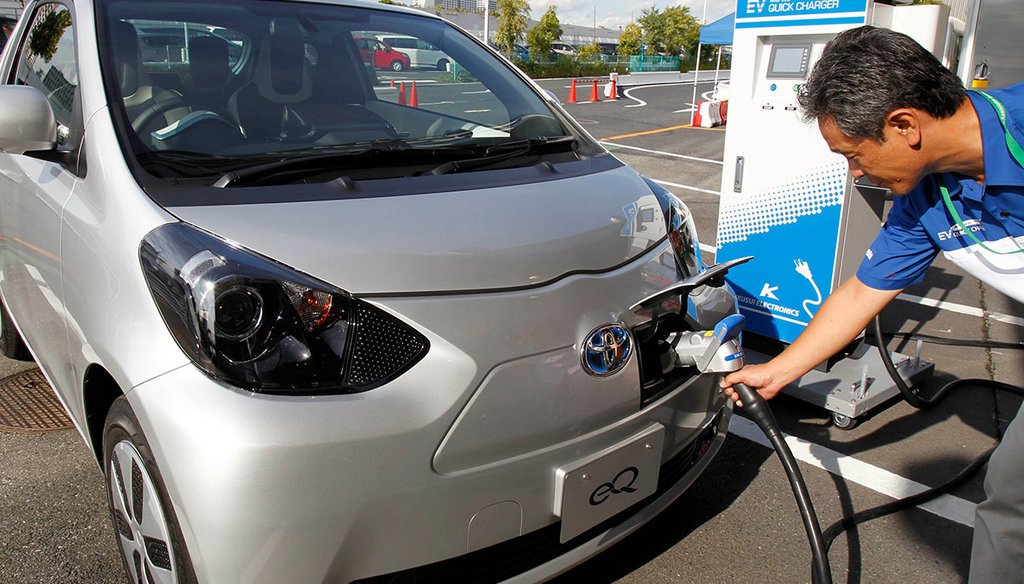Stand up for the facts!
Our only agenda is to publish the truth so you can be an informed participant in democracy.
We need your help.
I would like to contribute

A Toyota Motor Corp. press event participant puts a quick charger plug into the newly-developed compact electric vehicle "eQ" during a test drive Sept. 24, 2012, at a press event in Tokyo. (AP)
If Your Time is short
-
There are several different calculations for how long it takes for an EV to reach “zero emissions.”
-
Several estimates say that after about 15,000 to 20,000 miles of driving an EV, it will have offset the carbon emissions generated by building it. Other estimates are higher.
Electric cars aren’t perfect. Producing and transporting them requires energy, and that means buying one has a carbon footprint.
But offsetting the emissions created in production does not take as long as one social media post claimed, if you consider the carbon savings by driving electric over gasoline.
The Facebook page Weird World posted an image of electric cars recharging with this statement: "An electric car needs to be driven about 78,000km before it matches the carbon footprint of a petrol car because of the energy used in its production, new research has claimed."
The post was flagged as part of Facebook’s efforts to combat false news and misinformation on its News Feed. (Read more about our partnership with Meta, which owns Facebook and Instagram.)
We sent an email to the address listed on the Weird World, but received no evidence of the new research.
The claim may have originated from a 2020 article by the U.K.-based The Times headlined, "Electric cars only greener than petrol after 50,000 miles." That’s rounding up from 48,500 miles, or about 78,000 kilometers, mentioned in the story.
Auke Hoekstra, an electric mobility researcher at the Netherlands-based Eindhoven University of Technology, broke down several of the issues with the Times article and the report it sources, which Clarendon Communications, a company founded in 2020, produced.
Hoekstra and other entities that support clean energy projects noted a connection between Clarendon and client Aston Martin, a maker of sports cars.
One issue with the report, Hoekstra suggests, is the comparison of one type of electric car with one type of gas-powered car. Additionally, Hoekstra’s paper claims the report exaggerated emissions from EVs, underestimated battery lifetimes, ignored the potential for electricity to be produced more cleanly in the future and downplayed fuel production emissions.
Ultimately, Hoekstra suggests that a better break-even point estimate is 16,000 miles, or about 26,000 kilometers.
Zeke Hausfather, a climatologist and senior fellow at environmental research center The Breakthrough Institute, came up with a similar 15,000-mile break-even estimate in an article for "Carbon Brief," a U.K.-based news site focusing on climate change.
Reuters arrived at a similar conclusion. Using a model developed by the Argonne National Laboratory, Reuters determined that a Tesla Model 3 would need to be driven 13,500 miles before its carbon savings paid off, compared with a Toyota Corolla, when driving in the United States. That’s about 22,000 kilometers.
However, not all scientists agree with putting the break-even point that low.
A 2022 report from the Union of Concerned Scientists estimated the "zero emissions" break-even point is 21,300 miles for an electric vehicle. Another researcher, Damien Ernst at the University of Liege in Belgium, suggested the EV break-even number was between 42,000 and 94,000 miles.
Why do estimates vary?
"It mainly depends on the electricity mix over the lifetime," Hoekstra told us. "Secondly, it depends on battery size and type versus the frugality of the combustion car you are comparing against. The biggest problem is that most calculations are made very imperfectly."
Hausfather said in an email, "Battery manufacturing is quite emissions intensive, though there is some disagreement in the literature about the precise values."
Excluding the battery, he said, the carbon emissions for producing gasoline-powered cars are similar to the emissions for producing electric vehicles. Furthermore, renewable electricity and battery technology are expected to improve with time.
Our Sources
John Stossel, "Electric Cars: Inconvenient Facts, Part One," (archive), Nov. 1, 2022
Auke Hoekstra, "Comparing the lifetime greenhouse gas emissions of electric cars with the emissions of cars using gasoline or diesel," accessed Dec. 2, 2022
Clean Technica, "Aston Martin Linked To Study Spreading Misinformation About EVs," Dec. 1, 2020
Michael Liebreich, "Astongate: fake emission figures, an embattled carmaker and a sock puppet PR company," Nov. 30, 2020
Carbon Brief, "Factcheck: How electric vehicles help to tackle climate change," updated June 2, 2022
Reuters, "Analysis: When do electric vehicles become cleaner than gasoline cars?" July 7, 2021
U.S. Department of Energy, Alternative Fuels Data Center, "Emissions from Electric Vehicles," accessed Nov. 5, 2022
Damien Ernst, "Electric car: 697,612 km to become green! True or false?", March 10, 2019
PolitiFact, "CO2 output from making an electric car battery isn't equal to driving a gasoline car for 8 years," May 11, 2021
Email interview with Zeke Hausfather, senior fellow at The Breakthrough Institute, Nov. 7, 2022
Union of Concerned Scientists, "Driving cleaner: Electric cars and pickups beat gasoline on lifetime global warming emissions," (report), July 2022
Email interview with Auke Hoekstra, researcher of electric mobility at the Eindhoven University of Technology, Dec. 2, 2022




















